Like all Yellowknife businesses tied to tourism, Sundog has trod a rough path over the past few months but found summer camps to be a revenue lifeline.
With border closures and pandemic disruptions drastically cutting tourist arrivals after March, the outdoor adventure company was forced to modify and pare down its programming during the summer.
“There were no tourists. And we offer a tourism product so we had to adjust to that fact,” said Sundog owner Richard McIntosh. He started the company in January of 2018 with Christine Wenman.

“After Covid (hit in March) we shut down completely and then we reopened in the springtime or early summer offering camps instead of our regular on the water tours.”
While Sundog’s busiest season is normally the winter, its roster of summer programs is still robust and includes boating and canoe tours, fat biking and birding.
One of its most popular summer offerings is the Heritage and House Boat Tour, where Sundog gives historical tours of the Giant Mine site and around the houseboats and finishes off with a fish fry.
But most of those activities haven’t happened this summer due to the lack of tourists, either from elsewhere in Canada or overseas.
“A good chunk of (summer customers) are from family visiting friends and relatives. But again, we didn’t get those this summer, either. “
Out of necessity, the company shifted its focus to find new revenue streams in the summer. In late June it launched day camps for children.
“We take the kids out to Pillow Island and do outdoor adventure stuff on the island. And then we also partnered with a local tour operator, Bluefish Services, to do fishing,” McIntosh said.
“We know (now) there’s a market there. They were successful, they were filled up, but we only had four weeks of day camps.”

Despite the success of those camps, McIntosh said the Covid-related safety precautions of exposure control, risk assessment planning and physical distancing limited the number of customers they could pack into a boat.
Since the end of July the company has rolled out other water-based tours, such as a storytelling and photography tour with local artist Bill Braden every Wednesday night.
“And we’ve packaged with Ahmic Air to offer a fly-in shore lunch for guests. And then we meet them out there and do a half-day shore lunchut those have been slow on the uptake.”
McIntosh said the spring and summer slowdown represented a “considerable” reduction in business revenues, though he didn’t offer specifics.
Being a small company with only a few full-time staff, McIntosh didn’t have to lay many people off, except for one staff member who left the company and who wasn’t replaced.
He received some assistance from the Canada Emergency Response Benefit (CERB), which helped him keep staff on. He currently has two full-time employees. In the summer, he normally has more part-time staff. During the winter, he has two to three full-timers and some part-time staff.
With the start of winter just a few months away, Sundog is looking at how it can adjust its programming to attract customers as there are no signs that tourism will return this year.
Its Husky-powered kick-sledding programs are among their most popular but McIntosh doubts they’ll draw the same numbers of winter customers they’ve had in the past while the pandemic leaves tourism moribund.
“We’ll adjust our programming so that it appeals more to locals,” he said. “We will probably increase our menu of activities offered, because kick sledding was just one activity we were very much focused on.
“Locals will come out and support (us) but they’re less likely to come out and support in the cold winter months of December, January and February. We can’t earn enough revenue in one month to get through the winter.”

